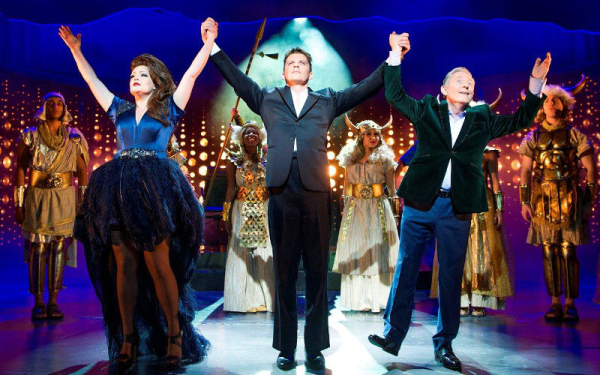Guest Blog: Critics still have the power to make or break shows
Freelance director and producer Henry Filloux-Bennett argues that critics need to take more responsibility, following the recent mauling of new musical ”Water Babies”

© Johan Persson
Critics have been down-playing their might for many years (this isn't an attack on just one critic); little old us, they'll say, of course we don't have any real power. But Gardner's comment, hot on the heels of an article criticising the lack of new West End work from commercial producers, was misjudged.
@FillouxPastry @guardian I certainly don’t have the power to kill any show. Only the show itself kills the show
— lyngardner (@lyngardner) May 9, 2014
Following many years' development and around one million pounds of commercial investment, Water Babies recently opened at the Curve Theatre in Leicester – with a view no doubt to a West End transfer.
This is new musical theatre from an exciting team of emerging (and established) creatives, the tickets are affordable (even premium tickets are just £35) and, crucially, it's good. Don't take my word for it – have a look on the Twittersphere and you'll see any number of incredibly positive reviews from the paying public.
This then, is exactly the sort of work that critics want, right? Wrong. The morning after press night in Leicester, the Guardian's many thousands of readers were treated to a one-star review of this "terminally high-minded and interminably long" "mess" of a musical with "its fatal mix of musical blandness and emotional mawkishness."
And the Guardian wasn't alone. Dominic Cavendish of the Daily Telegraph delighted in his "water-torture to watch" word play, and Kate Bassett of The Times was doing her best to critique the show intelligently, saying that she felt as if she'd "been sucked into the North Atlantic garbage patch, the gyre in the ocean that's a soup of chemical sludge and decaying plastics."
I wonder how proud these critics are of their assessments of Water Babies, filled as they're not with insightful criticism, nuanced as they're not by years' worth of professional experience in reviewing theatre.
This is grandstanding of the finest order, and they're wrong. Yes, for sure, they're Wilde-, even Waugh-witty, but these reviews are written for one clear purpose – to entertain their readers – and just as surely they have one outcome, and one outcome only: to kill the show. Because the simple truth is, like it or not, critics do have the power to kill any show they choose.
Of course we can all point to the exceptions. Yes, there's Les Misèrables, there's even We Will Rock You, and there will forever be productions that last despite the critics. For the most part that's because their producers can afford to ride out the storm, knowing as they do that the critics are simply wrong, and pumping hundreds of thousands, if not millions, into convincing us to give them a chance. Ten, twenty years later, they're still with us.

And of course there are also the shows that fail despite the critics. I Can't Sing!, one of the most perfectly entertaining, madcap productions of the last decade, closed despite being both brilliant and generally liked by the critics. But let's not allow the critics to believe that they can't kill shows. One needs only to walk down Shaftesbury Avenue, or pick up a paper, or go on a tube or a bus, or just open one's eyes, to see the power that the critics still hold. Anywhere you see a quote from a review, or more usually a set of four or five stars on a piece of artwork, there's your proof.
Producers need stars, need quotes, to sell their shows. The critics provide the marketing equivalent of oxygen to productions, allowing them to survive. Productions don't just miraculously transfer from the likes of the Almeida or the Royal Court – no, they transfer only if they have such glowing reviews that they simply must transfer. The Jerusalems, the Handbaggeds and most probably the King Charles IIIs of this world have one thing and one thing only in common with each other. Five stars. And lots of them.
But if you can open your eyes to this plainest and simplest of facts, then you must also accept that clearly the reverse is true. If a production gets slated, irrespective of how good it is – no, dear reader, a bad review does not always equal a bad show – then the show's oxygen has been cut off. There is simply nothing that can be done. You can buy all the advertising space in the world, you can put your artwork on every bus in the country, but there is absolutely no point doing that without, you guessed it, stars and quotes. If cutting off the oxygen to a show isn't killing it, I don't know what is.
Mark Shenton has said that "there’s nothing worse in the theatre than indifference". And in one sense, he is absolutely right. But I long for a day when critics will understand the power they hold over productions, and in true ‘Superman’ style use that enormous power with responsibility. In an environment when raising money from investors is near enough impossible, when producers are struggling against the commercial and subsidised juggernauts of this world to get their product to a West End stage, it is now more than ever that the critics should be encouraging new work, finding the positives and not just going for a cheap shot.
Do you agree that critics still have the power to make and break shows? WhatsOnStage has analysed the reviews of several leading critics over the past 12 months (including our own Michael Coveney) to see how they compare…

NB this is an edited and updated version of a blog originally posted last week













